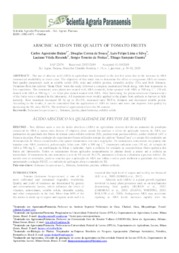Abscisic acid on the quality of tomato fruits.
Abscisic acid on the quality of tomato fruits.
Summary: The use of abscisic acid (ABA) in agriculture has increased in the last few years due to the increase in ABA commercial availability at lower costs. The objective of this study was to determine the effect of exogenous ABA on tomato fruit quality parameters such as soluble solids (SS), total and soluble pectins, titratable acidity (TA) and flesh firmness. Tomatoes from the cultivar ?Santa Clara? were the study followed a complete randomized block desig, with four treatments in five repetitions. The treatments were plants not treated with ABA (control), foliar sprayed with ABA at 500 mg L -1, 150 mLdrench with ABA at 500 mg L-1, or foliar plus drench treated with ABA. After harvesting, the physicochemical characteristics of the fruits were evaluated in the laboratory. All treatments were weekly applied to the plants from anthesis to harvest at fully maturity. Root treatment increased SS by up to 26.12%, increased ratio SS/TA, firmness and decreased soluble pectin. According to the results, it can be concluded that the application of ABA to leaves and roots can improve fruit quality by increasing the SS, ratio SS/TA. The method of application affects the SS content.
Publication year: 2020
Types of publication: Journal article
Unit: Embrapa Semi-arid Region
Observation
Some of Embrapa's publications are published as ePub files. To read them, use or download one of the following free software options to your computer or mobile device. Android: Google Play Books; IOS: iBooks; Windows and Linux: Calibre.
Access other publications
Access the Agricultural Research Database (BDPA) to consult Embrapa's full library collection and records.
Visit Embrapa Bookstore to purchase books and other publications sold by Embrapa.

